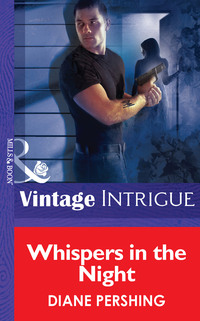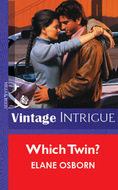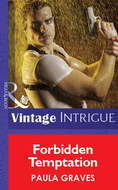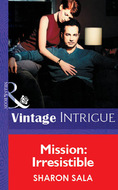Das Buch kann nicht als Datei heruntergeladen werden, kann aber in unserer App oder online auf der Website gelesen werden.
Buch lesen: "Whispers in the Night"
“Thank you, Paul.”
The look on her face was relaxed and full of trust. She closed her eyes, and in a moment he could see her even, shallow breathing, indicating that she was asleep.
He pulled up a chair and sat down next to her, watching her as she slept. He felt an odd stirring in the region of his heart, which perfectly complemented the way his gut was churning at his deceit.
He should be rejoicing; he was finally on the informant’s trail. In the next few days, Paul was sure, he’d be able to find him and complete his goal, the one he’d set in motion by coming here to work for Kayla.
What he was thinking about instead was something that gave him no joy whatsoever. He was starting to care about Kayla Thorne. To care about her a lot.
God help him. And her.
Whispers in the Night
Diane Pershing

DIANE PERSHING
cannot remember a time when she didn’t have her nose buried in a book. As a child, she would cheat the bedtime curfew by snuggling under the covers with her teddy bear, a flashlight and a forbidden (grown-up!) novel. Her mother warned her that she would ruin her eyes, but so far, they still work. Diane has had many careers—singer, actress, film critic, disc jockey, TV writer, to name a few. Currently she divides her time between writing romances and doing voice-overs. (You can hear her as Poison Ivy on the Batman cartoon.) She lives in Los Angeles, and promises she is only slightly affected. Her two children, Morgan Rose and Ben, have just completed college, and Diane looks forward to writing and acting until she expires, or people stop hiring her—whichever comes first. She loves to hear from readers, so please write to her at P.O. Box 67424, Los Angeles, CA 90067 or online at diane@dianepershing.com. You can also visit Diane’s Web site at www.dianepershing.com.
To Tom Gale, social visionary, poet extraordinaire and genial host. Thank you for the lovely week on your porch and the two books that came about as a result. Ain’t serendipity grand?
And to the small but vibrant artists’ colony of Cragsmoor, New York. I borrowed liberally from your history, edifices and geography; I also invented some history, edifices and geography, which is why it’s called fiction. If I offend, I apologize in advance.
Contents
Chapter 1
Chapter 2
Chapter 3
Chapter 4
Chapter 5
Chapter 6
Chapter 7
Chapter 8
Chapter 9
Chapter 10
Chapter 11
Chapter 12
Chapter 13
Chapter 14
Chapter 1
Creak.
The noise woke Kayla from a much-needed, dreamless slumber. Her eyes popped open and she sat straight up in bed. The bright red numbers of the bedside clock read 2:30 a.m. For several moments she remained frozen, trying to listen over the pounding of her heart. When nothing more happened, she figured—hoped—it had been her imagination, and slowly, she sank back down into her down-filled pillow, her lids drifting shut.
Cre-e-eak.
There it was again, coming from the porch directly below the bedroom. Not the high-pitched squeaking of the old chains that supported the double swing there, nor the cracking sound of tree limbs swaying in the wind. No, this was definitely creaking, and definitely coming from the porch, which had several loose wooden slats that protested loudly when someone was walking on them.
Like now.
All thoughts of sleep evaporated as fear coursed coldly through her veins.
Oh, God, Kayla thought. Something or someone was on the porch.
Quickly, her mind composed several explanations, none of them good. The likeliest was an animal. Of course, it would have to be a pretty heavy animal to make that noise. What kind of wildlife was up here? Deer? Coyotes? She shuddered. Bears?
She would ask some of her neighbors, although she used the word loosely; there was nobody around for a couple of miles. Maybe she was making a big deal out of the whole thing.
Cree-ee-eak.
Or maybe she wasn’t.
Her heartbeat accelerated. Were the doors locked? Yes, of course. The other times she’d been here at the cabin with Walter, he’d laughed gently at her city-girl fears and told her no one in the little mountain community of Cragsmont bothered locking doors. They all trusted one another. But without having Walter on this visit, she’d been unwilling to be quite so trusting herself. And the noises were getting louder.
What to do? Kayla’s mind raced frantically, keeping time with her pulse. She could hide under the bed. Throughout a nightmarish childhood, she’d discovered that the way to stay out of danger was not to call attention to herself, to avoid becoming a target.
But she didn’t do that anymore. For the past few years, she’d forced herself to meet danger and fearsome challenges head-on and deal with them. Not happily or easily, and not that the inner fear went away—no, she was pretty sure she was one of the most frightened people in the world—but, as best she could, she tried not to let the fear defeat her.
And she wouldn’t let it defeat her now.
Despite the dread, despite her rapid pulse rate, she summoned up reserves of strength. Throwing back the covers, feet dangling over the side of the bed, she ordered her imagination to rid itself of horrific fantasies while she considered her next move.
At that moment, Bailey woke up. The aging, partly deaf, one-eyed Yorkshire terrier began to bark. Not because of the noise below, but because Kayla had dared to disturb his sleep. Not much of a watchdog, old Bailey, but company, at least. The sound of his bark was high-pitched and annoying, and automatically, Kayla tried to shush him. Then she changed her mind. Maybe barking was a good thing; yes, in fact, Bailey’s barking might scare off the intruder.
Whoever or whatever that was.
Licking her suddenly dry mouth and shivering from more than the chilled night air of early autumn, she put on her robe and her ridiculous-looking-but-oh-so-warm bunny slippers, then grabbed the poker from the fireplace in the corner. Ancient wood floors protesting under her feet, she left the shelter of the master bedroom and, scooping up the yipping dog, crept halfway down the stairs.
“Hush,” she whispered to the small animal, briefly covering his snout with her cupped hand. He might frighten off an intruder, but her eardrums couldn’t take much more. Besides, Kayla needed to hear what was happening outside. Bailey, bless him, quieted down, curling his shivering body into a snug little ball. Holding him tightly, she strained her ears.
There was more noise below, only now it came not from the porch, but from the side of the house. There was the sound of rustling leaves, crackling branches, and then a kind of moan-grunt-growl.
Oh, God. Was that how a bear sounded? City girls didn’t know a grunt from a growl from a snarl, or what kind of animal emitted which. Well, one thing was for sure, she was not going outside to check it out. If whatever it was out there wanted her, they’d have to come in and get her, and that was what fireplace pokers were for.
So, still trembling from the icy cold and her jangling nerves, Kayla sat down on the second-from-the-bottom step and peered through the banister rails at the uncurtained windows and beyond. The middle of the night was a very dark time; all she could make out were the tall trees of the forest that surrounded the property and the shadows cast by the full moon.
Full moons and werewolves?
Do not go there, she admonished herself, her teeth chattering as she stifled a nervous giggle. The real world was scary enough without having to bring in the paranormal.
Which she didn’t believe in, anyway…mostly.
Bailey’s whimpering broke off that avenue of thought, and she held the tiny dog more tightly as he buried his face in her armpit. No, not much of a watchdog at all, she mused again ruefully. Poor baby.
Her ears strained to listen for more noises. And they were there—more branches crackling, another growl or grunt, a longer moaning—definitely chilling, but moving farther and farther away.
And then there was silence. Seconds stretched into minutes of absolutely no sound, save for the soft rustling of leaves and a far-off hooting owl.
Kayla’s adrenaline rush of fear receded with the sense of danger. It might return, of course, but for now she felt her body relaxing. Sighing, she reflected that nothing in her life ever went simply, without complications. Even the escape to her late husband’s family cabin, and the hoped-for solitude and peace it offered.
She’d been here for two days, since Friday, and mostly she’d sat on the broad, wood-slatted porch that ran the entire width of the house and stared out at the view: the Catskill Mountains glowing with autumn colors and shifting light. A small valley, with tiny villages nestled among the hillsides. More glorious reds and yellows and oranges. Acres of piercing blue sky above the ridge.
And Kayla hadn’t been happy, not yet. But she’d felt the beginning of healing, at least. Now, if she could just get a good night’s sleep…
Her wish would not be granted on this night, for sure, not with her nocturnal intruder. She was, after all, the only one up here; there was no more Walter to offer shelter and strength. Which brought to mind one fact she had always known: When push came to shove, she was, once again, and always, alone.
Knock, knock, knock. “Miz Thorne?”
Kayla jerked awake with a start, not quite sure where she was. Disoriented, she glanced around at her surroundings. It seemed to be daylight. “What?” she mumbled.
Knock, knock, knock. The repetition caused her to turn her head in the direction of the noise. There were two faces, both male, peering at her through the living room window. She started; her sudden movement woke Bailey up and he began barking again.
“Hush, Bailey,” Kayla said, but the little dog kept it up, so she was forced to resort to “Go fetch Arnold,” the signal for him to hunt for his small rag doll and bring it to her. And to quieten.
As the animal took off, Kayla waved weakly at the newcomers, one of whom she knew, and pointed back where there was a side entrance to the house. Rubbing at her face, she hurried through the living room, into the kitchen, then opened the door.
“Mr. Boland,” she said, nodding, trying to sound awake even though her mouth felt as if someone had injected sour milk into it during the night. Apparently she’d fallen asleep on the stairs, sitting up; her mind felt woozy and her back ached.
“Hank,” the middle-aged, potbellied and balding man corrected her with a smile, one that revealed two gold-capped upper incisors. “None of that ‘mister’ stuff needed.”
“Hank,” Kayla repeated, then added with an answering smile, “Please come in.”
As he walked past her, she shifted her attention to the other man, the one she didn’t know, and who remained outside, a little distance away. The instant she got a good look at him, however, the smile disappeared from her face, and she hissed in an involuntary breath.
Good heavens, he was huge! Fearsome, too. An Incredible Hulk, only better-looking. And not green.
The stranger was several inches over six feet. His dark hair was clipped very short, as if it was growing out after having been shaved off. Olive-colored skin covered a slightly hooked nose, chiseled cheekbones and chin line. His mouth was thin and stern. He reminded her of those early photographs of smileless Native American warriors. His new-looking jeans, scuffed work boots and faded denim jacket over a black T-shirt did nothing to disguise the broad, powerful body beneath. Bodybuilder powerful, a look she’d never cared for.
But it was the expression, or lack of it, in his pale eyes under heavy black brows that made her swallow again. Hard and bleak, not a flicker of warmth, or even life, in them. A shiver of trepidation bordering on fear skittered along her spine.
Hank made a come-on-in gesture to the man. “This here’s Paul Fitzgerald. He’s real good with his hands.”
Automatically, Kayla looked at the newcomer’s hands. Large, broad, callused. Capable of inflicting severe pain, she was sure. “Is he,” she murmured.
“Paul’s one of my new guys.”
New guys? she wondered briefly, but then she remembered what Walter had told her about Hank Boland. The hardware store owner-plumber-electrician-handyman in Cragsmont’s tiny town center, three miles down the road, was an ex-con, and he believed in giving a second chance to those who’d served their time at the nearby penitentiary.
Which meant the stranger standing at her back door had recently been incarcerated.
Terrific. Just terrific. The perfect way to start the day.
“I see,” she said, swallowing before adding automatically, “Pleased to meet you, Mr. Fitzgerald.”
Lame, she told herself, truly lame, as the stranger nodded curtly. She was so not pleased to meet him. An ex-con and a truly scary-looking one, at that.
Something in her attitude must have transmitted itself to the newcomer because he didn’t come any closer and he didn’t offer to shake hands, for which she was grateful; if he took one of hers in his, she might never see her poor fingers again.
“Yeah, Paul here can fix anything,” Hank said cheerfully. “Used to do some remodeling. He’s real good.”
“I see.”
“I was coming up to check on that leak in the church floor you mentioned on Friday afternoon. And I figured I’d bring someone to take care of that list of chores you need done,” Hank continued, smiling again as he produced a piece of paper with notes scribbled on it. “Paul’s just the man for you.”
Wrong, she wanted to say. Most definitely. No one who appeared that cold, who radiated suppressed violence from every pore, was the man for her. Good heavens, he was the walking incarnation of her worst nightmare.
What had he been in for? she wondered. Terrifying innocent victims into early graves?
Her hand flew to her chest as she realized that, for the second time in several hours, she was scared to death. First her night intruder, now this behemoth who could have been cast as the Really Bad Dude in a biker movie. If she stayed in his presence any longer she was in danger of having a panic attack.
“Can’t you do it?” she asked Hank, aware that her voice held more than a tinge of desperation.
“Sorry. I’m real busy with the Gillespie place. Whole roof is rotted from last year’s ice storms. Got to finish that job before winter comes again.”
“Come on, Hank,” the other man growled, his voice low pitched and irritated as he turned away. “I’m making the lady uncomfortable.”
“No, wait.” Hank scurried out the door again and grabbed the large man’s arm to keep him from leaving. Then he turned to Kayla. “Miz Thorne,” he pleaded. “Give him a chance. He got a real raw deal. He wasn’t even guilty.”
“Isn’t that what they all say?” It was out of her mouth before she could stop it, and she was rewarded with a look of cold contempt from Fitzgerald.
“No,” Hank replied, pushing at the larger, extremely reluctant man, urging him closer to Kayla. “I mean, he really wasn’t guilty. He was framed. Paul here should never have gone to jail. He was innocent.”
These words, coupled with the sincerity on Hank’s face, made Kayla pause. She took in a deep breath then exhaled it, giving her time to regain her composure. Then she made herself return her gaze to the huge man one more time, trying for objectivity.
He stood just back from the doorway now, less than a foot from her, and, once again, the sheer size of him overwhelmed her. She was five eight, but she had to crane her neck upward to see his face. It remained unsmiling—his eyes were an unusual silver-gray, she noted—and his expression remained hard. It was obvious he was not trying to curry favor or to win her over in the least.
Which, for some odd reason, impressed her. Kayla knew what it was like to be categorized, unfairly judged and then disdained. Surely she owed it to herself, if not to him, to give the man a chance to be seen as an individual.
Besides, her reaction to the stranger wasn’t really about him at all, and she knew it. It was her custom to be rigorously honest with herself, and what she was dealing with here was old stuff, an automatic fear response to a highly testosterone-fueled member of the male sex, a subgroup she could live the rest of her life without, thank you very much, and be quite content.
“Well…” She clung to the doorknob, still vacillating between reason and the instinct to flee.
Just then, Fitzgerald glanced down at her feet—at her bunny slippers, for heaven’s sake, which she had forgotten she was wearing. When he looked up again, she glimpsed a brief flicker of something close to amusement in his eyes. In the next second it was gone, but she’d seen it, and it made her reconsider. She would keep an open mind, give the man a chance.
“Well, um,” she said again, “I think it’s time I washed my face and changed into actual clothes. Help yourself to coffee. Both of you.” She indicated the automatic coffeemaker she’d set last night before going to bed. “I’ll be right down.”
When the woman turned and hurried quickly out of the kitchen, Paul’s gaze followed her movements. Mouth suddenly dry, he licked his lips. He felt like a long-starving man in a room that contained a three-course meal, one he wasn’t allowed to eat, but dammit, no one could stop him from looking. Even in a long robe, her womanly shape was apparent. Slim and tall, with an indented waist and gently rounded hips, she moved gracefully, despite those ludicrous slippers
When he’d first seen her standing in the kitchen doorway, the front view had been just as arresting as the rear was now. Shoulder-length, straight, pale blond hair, sky-blue eyes in a broad, high-cheekboned face that wasn’t beautiful but not plain, either. Character, his father would have said. The woman had character.
She also had breasts—full, rounded ones. He could tell from the way the robe was tied and from the way they bounced gently as she moved.
Real breasts. Real hips. Real blue eyes. Not pictures. A real, live, graceful, damned attractive woman.
Who wasn’t too nuts about him.
Not that he blamed her. He was hard and he was angry. He had nothing left in him of politeness or manners. In the past four years, civilized behavior had been slowly leached out of him by his brutal surroundings, until he’d learned just to survive. However he could.
As Hank poured them two generous cups of coffee, Paul walked over the threshold into the kitchen, musing that he’d accomplished the first part of his purpose, gaining access to Kayla Thorne. But he’d been knocked for a loop by the woman who’d greeted them. She was so different than he’d expected her to be. In the pen they’d watched a lot of TV, and Kayla Thorne was all over the tube. She was famous. Infamous, really.
It was a great story. She’d been a special-duty nurse to millionaire Walter Thorne’s ailing wife. Then six months after the wife croaked, she’d married Thorne, who, at age seventy, was forty-five years her senior. There had been three years of marriage, but the age difference and polar-opposite economic status had given the tabloids and gossipmongers a field day. Thorne had died last year, and she’d been left a wealthy woman, sharing an estate of several million dollars with Thorne’s grown sons.
In all that time, Mrs. Thorne never gave an interview, never talked about herself, never defended herself. During the marriage and since. So the media had invented a personality for her, a cross between a wet-dream fantasy and money-grubbing schemer. Before the wife croaked, was there kinky stuff going on between the old man and the sexy nurse? they’d asked. Had the two of them murdered the first Mrs. Thorne? they’d implied. And finally, had she cold-bloodedly knocked off the old man?
She’d been officially cleared of any complicity in either death, both of which were from natural causes, but suspicion remained, even in Paul’s mind. Money could buy you all kinds of ways to cover up a crime. Besides, once he’d heard her maiden name, Vinovich, he’d associated her with lowlifes and liars. He had a lot of evidence and personal experience to back that up.
Judging from this first meeting, however, unless she was one hell of an actress, it appeared as though both his and the media’s assumptions had been off base. Kayla Thorne was softer than her pictures. More of a real person than a viper. The blond hair was natural, not bottle-created. She was polite, too, no diva, not one of those la-di-da, newly wealthy, lady-of-the-manor types.
The house was a surprise, too, from the outside for sure. Old, shabby even. Needed a third of the slats replaced, a new paint job. No servants that he could see. The kitchen was like the “before” of a before-and-after remodeling ad. Except for the shiny, new-looking coffeemaker and microwave oven, nothing in here had been updated in years. Old, bent pots and pans hung from hooks above the stove. The tile was chipped, the linoleum water-stained and ancient. One large, deep sink, probably installed in the 1930s. All that money and the whole place was ready for the wrecker’s ball. Damned strange was all he could say.
He heard her footsteps before he saw her appear from around the corner. He’d been propping a hip against one of the tile counters, sipping his coffee, but he straightened automatically as she entered the room, dressed in a comfortable-looking navy blue sweat outfit and tennis shoes, her hair pulled back from her face in a ponytail. Her face was shiny, as if she’d just washed it, which made her look about eighteen, although he knew she was about ten years older.
“Did you find the milk?” Avoiding eye contact with Paul, Mrs. Thorne directed the question at Hank, who sat at the small, two-person corner table.
“Sure did,” Hank said, “and the sugar.”
“Well, good,” she said, pouring herself a cup, taking a sip and then venturing a quick, sideways glance at Paul. The kitchen was small, there wasn’t a lot of room for maneuvering, so she stood close. He could smell fresh soap and some flowery kind of body lotion. For a moment, he felt light-headed.
“It’s good coffee,” he said, trying to remember how to be pleasant. He wanted this job, for more reasons than the obvious one, and it was, so far, not a done deal.
Out of nowhere, a small animal appeared in the doorway, something dirty and floppy in its teeth. Paul frowned. He’d never been a fan of Yorkshire terriers—rats with hair, he’d always thought of them—and his opinion was now reinforced as the runty-looking thing seemed to realize there were two newcomers in the kitchen. Dropping the toy from its mouth, it began a ferocious, high-pitched, extremely irritating round of barking.
The woman looked down at the tiny dog at her feet, then scooped it up into her arms. “It’s okay, baby,” she cooed, which made it stop barking and begin whimpering, an equally unpleasant sound, to Paul, anyway. “Bailey’s a little upset,” she told them. “We had some kind of nocturnal visitor and he got scared.” She caressed the animal some more. “You want a treat?” she asked him, then got a dog biscuit out of a nearby jar.
Paul watched her stroke the small animal’s head, scratch it behind its ears. Her hands were pretty and slim, her fingers long, with short, unpolished, efficient-looking nails. He sure wouldn’t mind those hands stroking his head, those fingernails scratching his skin, in all kinds of places.
At the image, he felt his body stirring. Damn. He really hadn’t expected his hormones to do a dance in Kayla Thorne’s presence. Although, he knew none of it showed; he’d trained himself to keep all emotion out of his expression, all physical reaction to a minimum. But now, as a free man—for the present, at least—it sure wasn’t easy.
Not that it had anything to do with this specific woman. In his state, she could have been any female of the species. On top of that, there were too many other sources of stimulation this morning not to have some kind of reaction. He’d been locked up for four years, and now here he was, on top of a gorgeous mountaintop. There was an endless expanse of forest all around, not to mention fresh, clean air, a warm kitchen, even freshly brewed coffee.
And the woman. His groin tightened even more with a fierce desire that nearly took his breath away. Yeah, most especially the woman.
She wasn’t the first female he’d encountered since being released five days ago. But it had been a long, long time since he’d been intimate with one, and at the moment, Kayla Thorne was provoking a reaction far stronger than anything he’d expected.
He didn’t like it. Not at all.
He angled his body away from her. “This place is pretty old,” he said, steering the conversation toward safer territory and figuring he’d score points if she thought he really did know what he was doing. “A hundred years or more, I imagine.”
“It was built in 1895,” she said.
“Just move in?”
“Hell no.” Hank answered the question cheerfully from the corner table. “Property has been in the Thorne family forever.”
Mrs. Thorne correctly read Paul’s one raised eyebrow. “Walter, my late husband, said he liked to keep it just as he remembered it as a child, before garbage disposals and subzero refrigerators.” A small, fond smile lit her face. “He was happy here, with his grandparents, every summer. A golden time, he called it.”
Damn, she had a great smile, Paul observed, attracted to her genuine niceness. Then he ruthlessly banished the thought from his brain. He had an agenda here, and none of the softer emotions were welcome. Besides, he no longer believed in much of anything having to do with men, women and possibilities.
Too close, Kayla thought. She was standing way too close to Paul Fitzgerald in the small kitchen. Despite the impersonal chill of his gaze, his big body radiated enough energy to power an electric blanket, and it was warming her up. Setting Bailey down, she said brightly, “I think the kitchen is a bit small for all of us, so shall we go outside?”
She swept past both men and out into the garden that covered the entire area between the house and the driveway. Whew, she thought, as the cool morning air hit her. If she had a folding fan, she’d flutter it in front of her face, that’s how hot her cheeks felt.
Hot now, shivering earlier, all in Paul Fitzgerald’s presence. But why such a strong reaction? He terrified her, that was why, she told herself. But was that all it was?
No, she was forced to admit to herself. Standing next to him in the kitchen, she had felt an odd kind of—what? A connection with him. Not to mention a quivery, shuddery sensation in various body parts. There was a name for it: chemistry.
Hello and welcome to good old-fashioned lust.
No! Her mind rebelled. How could that be? Paul Fitzgerald had the personality of a serial killer. Heck, he might even be a serial killer, for all she knew. And while there seemed to exist women who found potentially violent, dangerous men a turn-on, she was definitely not one of them. Never had been, never would be.
It was the lack of sleep, she told herself. Her fragile emotional state since Walter’s death. This, whatever it was between her and Paul Fitzgerald, was an aberration, and would soon pass. She fervently hoped. And she could help it along by not hiring him.
There! she thought, mentally brushing her palms against each another in job-well-done fashion. She’d made her decision. Fitzgerald was history. She was sorry if he needed the job, but her own peace of mind had to be her first priority.
The men had followed her out the kitchen door, and now the three of them stood along the fenced-in compost heap that was situated in the shadow of a tall pine tree. “I hate to sound stupid, Mr. Boland, I mean, Hank,” she said with another bright smile, avoiding Fitzgerald’s gaze, “but are there bears around here?”
“Bears?”
“I heard something last night. It woke me up, and I guess Bailey wasn’t the only one who got scared. I must have fallen asleep listening for it again.”
“Bears?” Boland repeated, scratching his head. “Could be. We’re on the edge of wilderness up here, you know. Or it coulda been a coyote, even a raccoon.”
“Are raccoons heavy enough to make the porch creak?”
“Well now—”
“There’s your culprit,” Fitzgerald said, cutting him off, crouching down and picking something out of the compost heap. “Chicken bones.”
“Excuse me?” Kayla said.
“If you don’t want to attract wild animals, you need to keep animal remains out of the compost. Carrot peelings, coffee grounds, stuff like that, is all that should go there. No bones or animal fat.”
The slight condescension in his tone made her cross her arms over her chest and declare defensively, “I know that.”
He raised one jet-black eyebrow. “Do you?”
“Yes. Walter, my late husband, taught me well, and I’m very careful about what I put in that compost heap. Nothing but vegetation. All other garbage is wrapped tightly in plastic and kept in the mudroom until garbage pickup day. I’m not a total fool, you know.” She was annoyed, at him for figuring her for a dimwit, and at herself for having lustful thoughts about him just moments ago.
Which, thank heavens, were now gone.
“Besides,” she said, her chin sticking out defiantly, “I haven’t had any chicken since I’ve been here, so there’s no way I could have put those bones in there.”
Again, the raised eyebrow, the shrug. Then he stood, towering over her, blocking out the sun with his body. “Maybe it was a tramp,” he said, hitching his thumbs in the back pockets of his jeans, the material of his T-shirt tightly stretched across pecs the size of boulders. “Some homeless guy. What do you think, Hank?”
Die kostenlose Leseprobe ist beendet.








